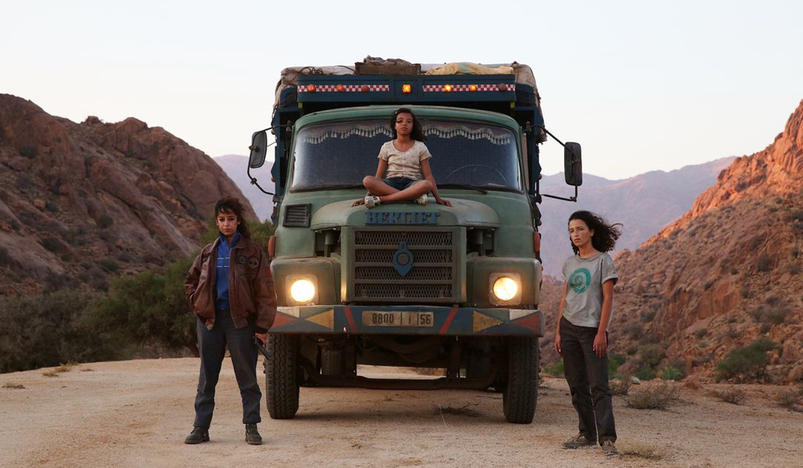
Doha Film Institute
A captivating slate of 13 films supported by the Doha Film Institute has been selected to the 79th Venice International Film Festival, a celebration of the worlds finest cinema and upcoming talents, to be held from Aug. 31 to Sep. 10, 2022.
With several sidebar and complementing events, the festival is among the most prestigious globally that aims to raise awareness and promote international cinema in all its forms as art, entertainment and as an industry. Underlining the diversity of the Doha Film Institutes support to independent voices in cinema, the selection includes movies from Algeria, Egypt, France, Jordan, Indonesia, Morocco, Palestine, Syria and Tunisia.
Fatma Hassan Al Remaihi, Chief Executive Officer of DFI, said: "We are incredibly proud to showcase 13 diverse films backed by DFI at the Venice Film Festival this year, underlining our commitment to support emerging Arab talent and filmmakers from across the globe. The selection includes bold, independent, and trend-setting films from across the world, that stand out for their diversity of themes and how the filmmakers approach their stories through innovative techniques that push the boundaries of conventional filmmaking. Their Venice debut will mark the beginning of an exciting journey for all these films, and I congratulate the teams behind them on their inclusion at this prestigious festival." Selected to the Orizzonti section, an international competition dedicated to films that represent the latest aesthetic and expressive trends is Autobiography (Indonesia, Singapore, Philippines, Poland, Germany, France, Qatar) directed by Makbul Mubarak, and nurtured at Qumra. It is a searing story of a teenager who is left alone after his father is imprisoned. He housekeeps the mansion of a retired general but finds himself in a quandary.
Another Qumra project, Nezouh (Syria, Lebanon, Qatar), directed by Soudade Kaadan, has been chosen to the Orizzonti Extra selection, which features up to 10 global works that demonstrate original creativity. The film is about Zeina, whose house ceiling is destroyed in a missile attack. Having been forbidden from opening a window earlier, she sees the outside world for the first time and makes friends with a boy next door.
The Last Queen (Algeria, France, Saudi Arabia, Taiwan, Qatar), also nurtured at Qumra, is an official selection to the 19th edition of Giornate degli Autori, an independent sidebar of the Venice Film Festival, modelled on the prestigious Directors Fortnight of the Cannes Festival. Directed by Damien Ounouri, the historical drama is set in 1516, when Algiers is a small Arabian-Berber republic, controlled by the Spaniards.
Dirty Difficult Dangerous (France, Lebanon, Germany, Qatar), the Institutes 2019 Spring Grants recipient, also screens in the Official Selection of the Venice Giornate degli Autori. Directed by Wissam Charaf, the film is about Ahmed, a Syrian refugee with hundreds of shrapnel wounds in his body, who roams the streets of Beirut to find love with Mehdia, an Ethiopian domestic.
Screening at the Critics Week, a parallel section of the Venice International Film Festival organized by the Union of Italian Film Critics (SNCCI) is Queens (Morocco, France, Belgium, Qatar), directed by Yasmine Benkiran. Set in Casablanca, the film is about 27-year-old Zineb, a repeat offender behind bars. When she learns that her wild and fanciful nine-year-old daughter has been expelled from school and sent to a childrens home, she escapes from prison, kidnaps her daughter, and heads south.
Six films supported by the Doha Film Institute feature in the 10th edition of the Final Cut in Venice, a workshop that aims to provide strong assistance in the completion of films from Africa and from Iraq, Jordan, Lebanon, Palestine, and Syria. These include: InshAllah A Boy (Jordan, Egypt, France, Qatar), by Amjad Al Rasheed is about a grieving mother shaken up by the sudden death of her husband, who is now at the risk of losing her home to her brother-in-law; Blacklight (Algeria, France, Qatar) by Karim Bensalah is about Sofiane, an Algerian who has enjoyed a relatively easy life growing up abroad as a diplomat's son ; Backstage (Morocco, Tunisia, France, Belgium, Norway, Qatar) by Afef Ben Mahmoud and Khalil Benkirane, is about a Tunisian contemporary dance troupe "Without Borders" that is concluding a Moroccan tour; A Fidai Film (Palestine, Germany, Qatar) by Kamal Aljafari, is set in the summer of 1982, and outlines the raid of the Palestinian Research Center by the Israeli army, tearing it up and carting away its library, containing 25,000 volumes on Palestine.
Suspended (Lebanon, Qatar), directed by Myriam El Hajj, is about three women who decide to turn to the courts to obtain divorces after waiting for many years and Land of Women (Egypt, France, Denmark, Qatar) by Nada Riyadh about seven teenage girls who rebel by forming an all-female street theatre troupe.
Two films supported by the Institute are selected for the Venice Gap-Financing Market. The 67th Summer (France, Egypt, Austria, Germany, Qatar) by Abu Bakr Shawky, narrates the story of a boy, an aspiring pianist and avid footballer, who starts writing letters to a young girl in another corner of the world. The feature documentary 5 Seasons of Revolution (Syria, Germany, Norway, Netherlands, Qatar) by Lina No Notion Films, Lina wanted to become a camerawoman, she liked filming details of life and people around her, mainly during a bright sunny day in Damascus. But with the uprising in Syria, It didnt take long before events escalated, and arrests, torture, and potentially life-threatening situations became a reality for Lina to negotiate on a daily basis.
(QNA)
.jpg)
Qatar Secures Place Among the World's Top 10 Wealthiest Nations
.jpg)
Hamad International Airport Witnesses Record Increase in Passenger Traffic

Saudi Arabia: Any visa holder can now perform Umrah

What are Qatar's Labour Laws on Annual Leave?
Leave a comment